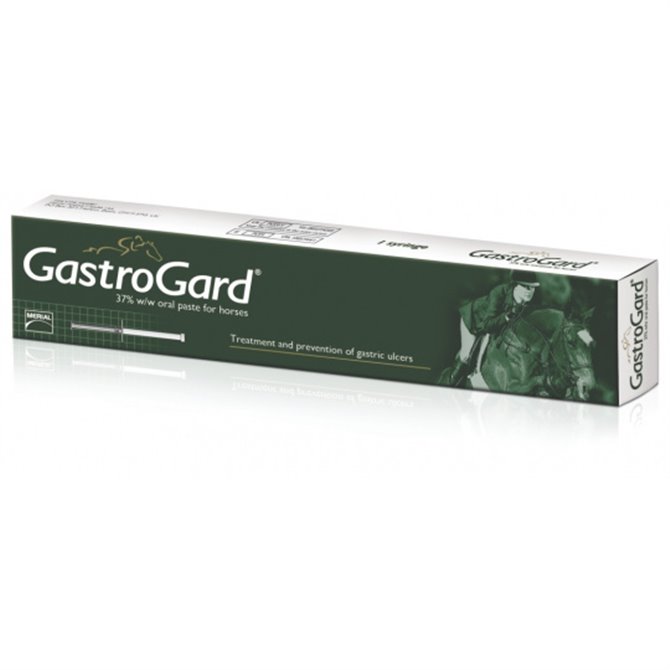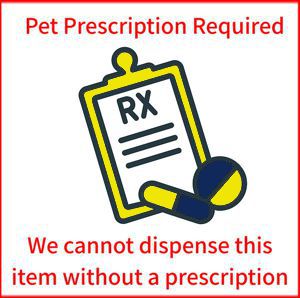
Gastrogard Paste for Horses - 14 Pack
772963
Gastrogard paste is indicated for the treatment and prevention of gastric and duodenal ulcers (stomach ulcers) in horses. VET PRESCRIPTION REQUIRED
Product Features
- Pack Size: - Sold Individually
- Target Animal: - Horse (Equine)
- Pet Prescription Required?: - Yes (For UK Orders)
- Active Ingredient: - Omeprazole
- Product Name: - Gastrogard Paste for Horses - 1 x syringe
More Information
Description
Gastrogard may only be supplied with a valid veterinary prescription issued by your vet. You should only purchase this item if you have or are in the process of arranging such a prescription. See information bar for further details.
Each syringe contains 6.16 g of oral paste, omeprazole 2.279 g (37% w/w paste). Also contains yellow iron oxide (E172).
Uses of Gastrogard
For treatment and prevention of gastric ulcers.
Dosage and administration of gastrogard for horses
Gastrogard is effective in horses of various breeds and under different management conditions, foals as young as four weeks of age and weighing over 70 kg, and breeding stallions. For oral administration.
Treatment of gastric ulcers: one administration per day during 28 consecutive days at the dose rate of 4 mg omeprazole per kg bodyweight followed immediately by a dosage regimen of one administration per day during 28 consecutive days at the dose rate of 1 mg omeprazole per kg bodyweight, to reduce the recurrence of gastric ulcers during treatment.
Should recurrence occur (confirmed by gastroscopy), re-treatment at a dose rate of 4 mg omeprazole per kg bodyweight is recommended.
Prevention of gastric ulcers: one administration per day at the dose rate of 1mg omeprazole per kg bodyweight.
Dosing
To deliver GASTROGARD at the treatment dose of 4 mg omeprazole/kg, set the syringe plunger to the appropriate dose division for the horse’s weight. Each full dose division on the syringe plunger delivers sufficient omeprazole to treat 100 kg bodyweight. The contents of one syringe will treat a 575 kg horse at the rate of 4 mg omeprazole per kg bodyweight.
To deliver GASTROGARD at the dose of 1 mg omeprazole/kg, set the syringe plunger to the dose division equivalent to one quarter of the horse's bodyweight. At this dose, each full division on the syringe plunger will deliver sufficient omeprazole to treat 400 kg bodyweight. For example, to treat a horse weighing 400kg set the plunger to 100kg.
Replace cap after use.For animal treatment only.
Not recommended for animals under 4 weeks old or weighing less than 70 kg bodyweight.
Pregnancy and lactation: Laboratory studies in rats and rabbits have not produced any evidence of a teratogenic effect. In the absence of data during pregnancy and lactation, the use of GASTROGARD in pregnant and lactating mares is not recommended.
Interactions: Omeprazole may delay the elimination of warfarin. No other interaction with medicines routinely used in the treatment of horses is expected, although interaction with drugs metabolised by liver enzymes cannot be excluded.
Overdose: No undesirable effects related to treatment were observed following daily use for 91 days at omeprazole dosages up to 20 mg/kg in adult horses and in foals older than 2 months. No undesirable effects (including on the semen quality or reproductive behaviour) related to treatment were observed following daily use for 71 days at an omeprazole dosage of 12 mg/kg in breeding stallions. No undesirable effects related to treatment were observed following daily use for 21 days at an omeprazole dosage of 40 mg/kg in adult horses.
Operator warnings: As this product may cause hypersensitivity in rare situations, avoid direct contact with skin and eyes. Use impervious gloves and do not eat or drink when handling and administering the product. Wash hands or any exposed skin after use. In case of contact with eyes, wash immediately with clean running water and seek medical advice. Persons developing a reaction after contact with the product should avoid handling the product in future.
Withdrawal periods
Withdrawal period for horse meat and offal: one day. Not permitted for use in mares producing milk for human consumption.
Keep out of the reach and sight of children. No specific storage conditions are required. Replace cap after use. Shelf-life after first opening the immediate packaging: 28 days.
Any unused product or waste material should be disposed of in accordance with national requirements.
In studies lasting up to 28 days, treatment with GASTROGARD at the dose rate of 1mg omeprazole per kg bodyweight per day has been shown to help prevent the occurrence of gastric ulcers in horses exposed to ulcerogenic conditions.
Omeprazole is a proton pump inhibitor belonging to the substituted benzimidazole class of compounds.
It is part of the pharmacotherapeutic group of antacids, for treatment of peptic ulcers.
Omeprazole suppresses gastric acid secretion by specific inhibition of the H+/K+-ATPase enzyme system at the secretory surface of the parietal cell. The H+/K+-ATPase enzyme system is the acid (proton) pump within the gastric mucosa. Because H+/K+-ATPase is the final step involved in control of acid secretion, omeprazole blocks secretion irrespective of the stimulus. Omeprazole irreversibly binds to the gastric parietal cell H+/K+-ATPase enzyme that pumps hydrogen ions into the lumen of the stomach in exchange for potassium ions.
Stress (including high performance training and competition), feeding, management and husbandry practices may be associated with the development of gastric ulceration in horses. Individuals responsible for the well-being of horses should consider reducing the ulcerogenic challenge by modifying husbandry practices to achieve one or more of the following: reduced stress, reduced fasting, increased intake of roughage and access to grazing.
GASTROGARD™ is a registered trademark of the Astra Zeneca Group of Companies.
(Pet Prescription Required)




